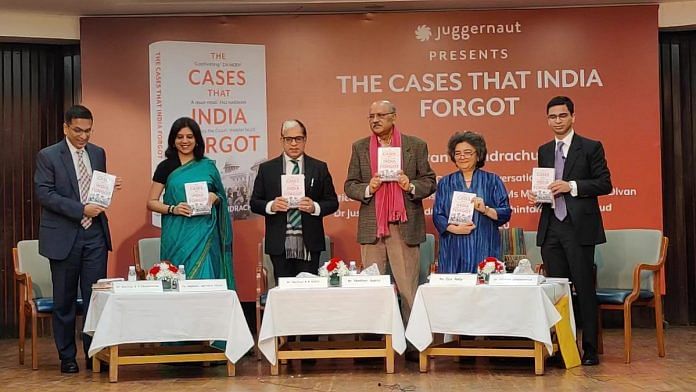New Delhi: Former Supreme Court judge Justice A.K. Sikri Saturday said India’s collegium system needs “reconsideration”.
Speaking at the launch of Chintan Chandrachud’s new book The cases that India forgot, he said, “Let me be very frank and blunt about this…we do have the process of evaluation of judgments [for elevation] but I would say that most of the time, we go by our impressions. It may not be a scientific study made about a particular candidate.”
Sikri also said, “…those who are appointed may not be deserving and many times, those who are deserving are left out. This needs to be taken care of.”
Also present at the launch were Justice D.Y. Chandrachud, Additional Solicitor General and senior advocate Madhavi Garodia Divan and managing partner of AZB & Partners Zia Mody.
The panel was moderated by Shekhar Gupta, editor-in-chief of ThePrint.
The cases that India forgot talks about 10 legal cases that “have all but faded from public memory”. It also details some other cases that have been criticised for various reasons.
Chintan Chandrachud, son of Justice D.Y. Chandrachud, is a lawyer at the London office of Quinn Emanuel Urquhart & Sullivan, LLP. He has previously authored a book titled Balanced Constitutionalism: Courts and Legislatures in India and the United Kingdom.
Also read: Modi govt sits on appointment of son of ex-SC judge who found Godhra train fire ‘accidental’
Lateral entry for judgeship
During the discussion, Gupta asked the panellists if there should be a greater scrutiny of judges’ verdict before they are elevated.
To this, Justice Chandrachud said changes in a “couple of areas” were needed in the process of appointment of judges. He also spoke about a suggestion put forward by him during the Roger Mathew case in which the Supreme Court scrapped the new rules for appointment of members to tribunals.
“It’s important that our collegium lays down, for wider society, the standards which we apply in the selection of judges,” he said.
Justice Chandrachud also said lawyers can be brought in for judgeship for shorter periods “like the lateral entry system in the government”.
“Why don’t we think of bringing in lawyers, for instance, on short term appointments to the high courts…say for five years? Say a top lawyer from the Delhi high court, who hasn’t become a career judge, will come in at the age of 50. [He will] work not in the Delhi high court, but in the Bombay high court, or the Gujarat high court. [He will] work for five years and then go back,” he said.
The judge also advocated greater diversity within the judiciary, and more women entering the profession.
‘Insulation’ of courts from society
Discussing the new book, Justice Chandrachud highlighted a need for greater engagement of work done at the courts with “life in the society”.
Talking about how courts remain insulated from the society, due to the nature of judicial process, he said: “That insulation is good in so far as your work is concerned as a judge…nobody can call you out and tell you what to do. But…that insulation should not be taken to a point where the meaning of the work which courts do doesn’t get transformed into the lives of the society.”
He later referred to a few other such books that “remind people of the dialogical roles that courts play”.
“It’s because of the dialogical role that we play which opens us to a social dialogue, as a part of wider constitutional socio-political institution,” he added.
Also read: Before Sabarimala, there were only 15 nine-judge bench rulings. Here are 5 landmark cases



